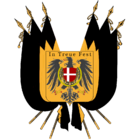Chancellor of Acrea: Difference between revisions
No edit summary |
No edit summary |
||
| Line 14: | Line 14: | ||
| incumbent = Dm. Lea Marie Gräfin Danneskjold von Västerlund | | incumbent = Dm. Lea Marie Gräfin Danneskjold von Västerlund | ||
| honorific_suffix = ROAS | | honorific_suffix = ROAS | ||
| incumbentsince = 13 May | | incumbentsince = 13 May 2018 | ||
| type = | | type = | ||
| status = Head of Government | | status = Head of Government | ||
Revision as of 18:39, 7 September 2020
| Chancellor of the Kingdom of Acrea | |
|---|---|
 Coat of Arms of His Majesty's Government | |
| Style | Chancellor (informal) Her Excellency (diplomatic) |
| Status | Head of Government |
| Reports to | Parliament |
| Residence | Kanzleramt (official residence and office) Thalerhof (country residence) |
| Appointer | Friedrich Leopold III |
| Term length | At His Majesty's pleasure |
| Constituting instrument | Reichsverfassungsurkunde |
The Chancellor of Acrea (German: Kanzlerin des Königreich Akriens; Dane: Kanslerin for Kongeriget Akrien) is the head of government of the Kingdom of Acrea.
The position originates from the late middle ages, when the office of Kanzler was created in the newly re-unified Acrean state as the chief minister overseeing both the noble legislature and the citizen's legislature- the early predecessors of the modern Reichshof and Landtag. As the role of the monarchy in the government evolved, the office of Chancellor gradually became the effective leader of the Acrean state with only the Crown ranking higher. The Monarch has the ability to dismiss the whole or part of parliament, and the ability to dismiss the Chancellor, however this power has never been practiced since parliamentary reforms in 1809.
The Chancellor and the government are, in practice, appointed by the Monarch, although today the appointment of the government is deferred to the Reichstag. The majority party then selects nominations for the position of Chancellor, who is typically but not always the leader of the party. There is no law restricting the social status of the Chancellor.
Historical Overview
The title and position of Chancellor has a long history dating back to the formation of the Reichshof in 1183. In the early days of the Acrean Empire, the Chancellor was the highest ranking dignitary and chief diplomat and was known as the Reichskanzler or Rigskansler. There were fairly strict special requirements to be met in order to hold the position; the individual needed to be a member of the nobility, and had to be of mixed Dane and Gothic blood. These were combined with much more typical standards that required the individual to be at least 30 years old, be of natural Acrean birth, and to have held prior political office. Eventually, with reforms during the Diet of Varberg in 1410, these special requirements were abolished. By contrast, however, other standards were tightened.
